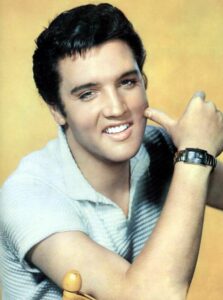‘Elvis’ looks at faith and foibles at root of cultural icon

Before he was the King of Rock and Roll, Elvis Presley was a young boy getting his musical beginnings in the small rural town of Tupelo, Mississippi. When he was 13, he and his family moved to the big city of Memphis and that’s where our story starts.
For you see, Elvis grew up with a love, not just for the church and the Lord, but for music, specifically the music of the South such as Gospel, Rhythm and Blues, Blues and Country.
The film begins with a young Elvis Presley having just completed his first recording with Sun Records and about to perform live. As he walks on stage, at first glance, to the audience, Elvis doesn’t look like anything special; in fact he looks kind of weird to them: his hair is too long, he wears baggy clothes.
But then Elvis takes a step back, takes a breath, and begins to sing.
As his vocal cords move, so do his legs and hips. All of a sudden, the girls in the audience start screaming and going crazy! “What are they all screaming about?” Elvis asks. “It’s the way you’re moving,” a bandmate says.
READ: Little Richard and his surprising faith story
The teens aren’t the only ones in attendance that night. Colonel Tom Parker (Tom Hanks), a manager (of sorts), is watching in earnest after hearing Elvis’ recording played on the radio earlier. As the Colonel watches the girls going crazy, he realizes Elvis is someone he needs to represent.
So the Colonel and Elvis meet. Elvis is excited at the prospect of being able to bring his music to others and be able to provide for his family. The Colonel promises him he will be able to do that and will help get him records, movies and even television.
There have been very few musicians, very few people in fact, who have had as impactful a legacy as Elvis Presley. Elvis profoundly redefined older forms of country, gospel, and rhythm and blues for an entire generation. At the time of Elvis’ existence, rockabilly (a combination of rock and roll and country) was losing much of its audience. Elvis took the musical parts of all of these types of music and brought them together (the guitars, the upright basses, the drums, the dancing). Elvis also broke the barriers of “musical segregation” allowing for both white and black audiences to appreciate and enjoy the same type of music.

“Elvis” is a brilliant, cinematic film that, as the REAL Priscilla Presley, Elvis’ ex-wife, stated, accurately depicts and honors the late musician with the respect he deserves.
As such, the film begs to ask the question, “Who was Elvis the MAN? The man you saw when the show wasn’t going on?” The movie doesn’t try to depict the real Elvis anymore than a musician doing his very best to give his fans the best performances he could, struggles and all (and boy, did he have struggles as many of us know). As Director Baz Luhrmann said in a recent interview
“He was not perfect. He was not a god. He was a person…”
The manifestations of Elvis are prominently displayed by actor Austin Butler. The amount of time, dedication and research that went into Butler’s portrayal of Presley is clearly displayed on screen—as this will, without a doubt, go on to be one of the finest performances of his career.
In that interview a reporter states that Butler spent “two years studying every musical aspect of Elvis’, all of Elvis’ mannerisms, traits and characteristics.” While he isn’t able to copy Elvis 100% musically (no person can), he comes very close (especially in the vibrato, or vibrations, to his sound).
Additionally, Tom Hanks puts in a stellar performance as Colonel Parker. The challenge for Hanks was how little he knew about the Colonel. He wasn’t called to play a stereotypical villain; anyone could have done that. He needed to be so much more. As Luhrmann states,
“If Shakespeare was looking to take on a historical character now, you couldn’t go past the idea of the Colonel and Elvis,” Luhrmann adds. “The Colonel is like Falstaff with a chainsaw. Because Shakespearean villains are never just a bad guy. Colonel Tom Parker absolutely did diabolical things. But he also did extraordinarily genius things. So everything is a paradox and a coin flip. That’s what makes him so delicious.”
The life of Elvis is an incredibly sad example of someone who came from a Christian upbringing, with a musical gift given from God, but allowed some of his fame and glory—glory that was meant for God—to corrupt him. Not to mention those who took advantage of him.
Priscilla Presley says that if Elvis were alive today that THIS would be the movie he’d want to envision.
Reviewer: Alex Malsan, Christian Spotlight on Entertainment (ChristianAnswers.Net). Used by permission. Copyright, Films for Christ.






